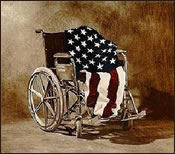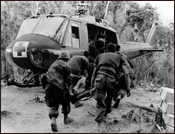The Flotsam of War
 Every so often, I use an iPad app to listen to American talk radio: I believe it’s a good way to find out what people on the other side of the Atlantic are thinking. This past week, I wanted an explanation for why Rick Santorum was doing so well in places like Alabama and Mississippi, which don’t seem natural stomping grounds for a Catholic Pennsylvanian.
Every so often, I use an iPad app to listen to American talk radio: I believe it’s a good way to find out what people on the other side of the Atlantic are thinking. This past week, I wanted an explanation for why Rick Santorum was doing so well in places like Alabama and Mississippi, which don’t seem natural stomping grounds for a Catholic Pennsylvanian.
My first port of call was a station in Missouri, which was playing the Glenn Beck programme. If memory serves, Glenn Beck was considered too off the wall for Fox News, and subsequently was “released” by them, in much the same way that people with mental health problems were pushed into “Care in the Community”. Now back on radio, he is even more unhinged: I speculated that he was for people who didn’t find Rush Limbaugh sufficiently screwy. I got little out of it except a distorted reading of history and a strange sense of paranoia: it would seem that right wing talk radio cannot see their liberal countrymen as having merely a different point of view, rather, the liberals are “dangerous”, “wacko” and wish to see the destruction of the United States. This kind of rhetoric rings a number of historical bells, none of which chime pleasantly.
After about twenty minutes, I switched over to a station in Texas: Rush Limbaugh was on the air and saying pretty much the same things. He also suggested that President Obama’s team had cooked up a series of diabolical plots to get the women’s vote. Perhaps strangely, I believed Rick Santorum’s antediluvian views had done the job for them. “Never mind,” I thought, and after about ten minutes, I was ready to switch off. I could only speculate that Santorum appealed to the frightened: the most vehement seem the strongest to the afraid.
What caught my attention most of all, however, was a public service announcement: a charity called Paralysed Veterans of America was soliciting donations. This sounded like an altogether worthy organisation, one that’s trying to help soliders injured in Iraq and Afghanistan lead as healthy and fulfilled lives as possible. They not only offer physical therapy, but also provide employment assistance, help for veterans with filling out benefit applications and they lobby the government on behalf of their constituents. One of the messages from the advertisement was that being an injured veteran was quite a lonely place to be, regardless of any military camaraderie that may persist. In Britain, we’ve long had a similar charity, the Royal British Legion: not far from where I used to live in London, the Legion ran a retirement home for veterans who otherwise would have had nowhere to stay. I suspect that the home is still operating to capacity.
As I switched off and returned to the altogether gentler airwaves washing out from BBC Radio 3, I thought about an episode of South Park I saw on a channel called “Viva” a few days previously. Viva specialises in showing programmes which are gathering dust: often they put on shows which really should remain in cold storage. However the episode I recalled was made around the time of the Iraq War and encapsulated the debate between pro and anti-war advocates. It was passionate and heated, even for a cartoon. Looking back, I am ashamed to admit that I thought the war was justified at the time: not because of what President Bush said, but because Tony Blair was taking such huge political risks, particularly with his own party. I assumed that he must have known something truly terrible; it seemed irrational to believe that he would do all this for nothing. As it turned out, it was a lie for which I’ve never forgiven Labour. South Park regurgitated some of the rhetoric of the time: people who were pro-war claimed to “support the troops”. I don’t recall them being particularly challenged on this.
Perhaps it’s due to the first Iraq War, in which laser guided bombs made combat seem like a gigantic video game. Perhaps we’re so saturated with images of blood and violence by 24 hour news, we’ve become desensitised to it, but nevertheless, it’s an illogical conclusion to think one supports the troops by sending them into battle. The men and women who stand armed at the ramparts are best supported by being kept right where they are. Their welfare is not best looked after by condemning them to drive along dry, dusty roads and risk death upon every turn. They are not aided by sending them to places in which they are often hated as occupiers, that anger sometimes simmering in a glare, sometimes manifesting in solace and support to the enemy, and sometimes resulting in active sabotage. Our troops are not given succour by sending them again and again on tours of duty traversing the same maelstrom. The stresses and strains this creates turns human beings into brutes: for example, the American staff sergeant responsible for killing 16 Afghan civilians had fought, suffered and apparently did not want to fight any longer.
 I have some idea of the effect that war can have: my father served as a medic in Vietnam. His role was to leap out of helicopters, gather up the wounded and drag them back in, providing emergency medical support en route to a field hospital. He often would also have to man the gun to cover their escape. One spring, long ago, we went to Washington DC to the Vietnam Memorial: for those who are not aware of this touching monument, it is not much more than a series of black stone slabs inscribed with lists of the fallen. It was a sunny day, the air containing the kind of warmth that only occurs after the earth has just been freed from any hint of further winter freeze. My father was looking for one name in particular: he found it about halfway along. I don’t remember the name, but I asked my father, “Who is he, Dad, a friend of yours?”
I have some idea of the effect that war can have: my father served as a medic in Vietnam. His role was to leap out of helicopters, gather up the wounded and drag them back in, providing emergency medical support en route to a field hospital. He often would also have to man the gun to cover their escape. One spring, long ago, we went to Washington DC to the Vietnam Memorial: for those who are not aware of this touching monument, it is not much more than a series of black stone slabs inscribed with lists of the fallen. It was a sunny day, the air containing the kind of warmth that only occurs after the earth has just been freed from any hint of further winter freeze. My father was looking for one name in particular: he found it about halfway along. I don’t remember the name, but I asked my father, “Who is he, Dad, a friend of yours?”
“No,” he replied, “he died in my arms.”
We stood there for a long, quiet moment. My father reached out his hand and touched the name etched in stone. Then we moved on.
Later, while clearing some items out of my old room, I found his photo album from his Vietnam days: there were pictures of him as a young man, smiling in a carefree way which was alien to me. He had also taken a picture of the barren landscape around his base: the caption on the back was my first indication that he and I ever shared a similar sense of humour. He had written, “Here is the Happy Valley. Note the lovely buildings, beautiful roads and wonderful scenery. Ugh!”
My father was a lucky man; he managed to leave the war without physical damage apart from contracting malaria. He went on to be a great success in life. But he too, like the Paralysed Veterans and the old gentlemen on unsteady feet at the Royal British Legion home, have more behind their eyes than most, retaining sights we cannot comprehend, nor do they wish to share. Support our troops? Then don’t consign them to be the flotsam of war.
We are living in an era of the hair trigger. Republican Presidential candidates who have never served talk openly and wildly about bombing Iran: the vacuity behind their eyes belies their ignorance. Those who don’t know war should respect what the glance that goes inward and backward tells us. War is the last resort. It is rare that its necessity is clear cut. It is rarer still that it achieves its desired results: we need only look at Iraq’s transition from a brutal dictatorship to a brutal pseudo-democracy which is more or less an Iranian client state to see this. We also need to remember that the consequences linger for decades. No doubt the Paralysed Veterans of America and the Royal British Legion will continue to do their good work long after I enter into my dotage. I can see myself with hands more wrinkled and gnarled than they are today, swiping my mobile phone over a scanner held by a fresh faced Royal British Legion volunteer, donating what I can. I hope that regardless of political outlook, this is what we all will do. While our military personnel did volunteer to put themselves in harm’s way, they generally have no political cause of their own, nor are they responsible for the imbecility or mendacity of politicians. But the consequences of that policy are all too real: does President Bush, I wonder, think of the veteran who is in a hospital in Maryland or Oregon, wearing a sweat soaked grey Army t-shirt, stretching, rising to stand on two artificial feet, hoping to recapture the youth and vigour so cruelly taken? Does Tony Blair, when out shopping, sometimes see a young man in a faded combat jacket who has lost the sight in an eye and wonder what has he done? Given the back slapping of today’s politicians in relation to potential wars of the future, I don’t think so. It is incumbent on the voters to not be so blind, to be deaf to the blandishment that combat is anything other than enervating, and to care for those who have already paid too high a price for both country and folly.


